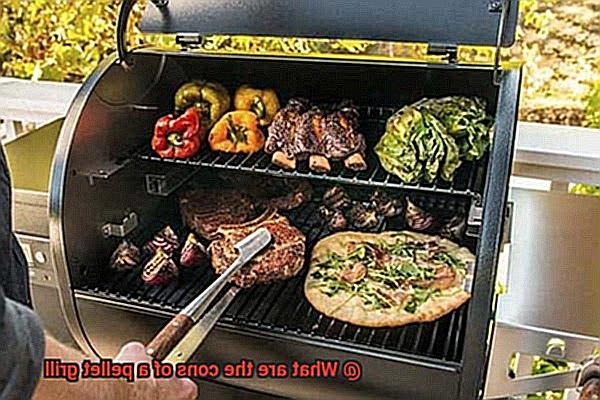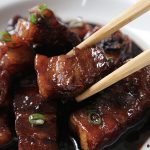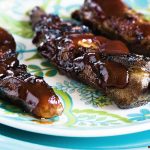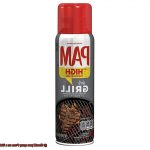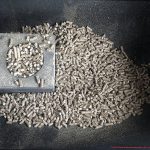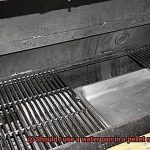Imagine yourself on a balmy summer evening, surrounded by your loved ones, gathered around a grill that’s sizzling with delectable food.
The aroma of succulent barbecue permeates the air, and you can’t help but feel excited for the feast that’s about to ensue. While most people would envision a traditional charcoal or gas grill in this scenario, if you’re a BBQ aficionado, you might be dreaming of something different – a pellet grill.
Pellet grills have gained immense popularity in recent years owing to their ease of use and their ability to impart smoky flavors to your food. However, as with any product or technology, there are always downsides to consider before making a purchase.
In this blog post, we’ll take an in-depth look at some of the cons of a pellet grill so that you can make an informed decision about whether it’s the right choice for you. From higher operating costs to potential durability issues, we’ll cover all the bases and give you a comprehensive picture of what to expect from a pellet grill.
So sit back, grab yourself a refreshing beverage and delve into our exploration of the drawbacks associated with pellet grills.
Contents
Cost
Pellet grills are known for their advanced technology, even heat distribution, and consistent temperature maintenance, but these features come at a price. Let’s explore the factors that contribute to the high cost of pellet grills and whether they are worth the investment.
Firstly, one of the main reasons why pellet grills are more expensive than traditional charcoal or gas grills is due to their advanced technology. Pellet grills use digital controllers and complex mechanisms to maintain a consistent temperature, which adds to the manufacturing and production costs of the grill. This technology is reflected in the final price, making it a significant investment.
Secondly, the ongoing expenses associated with using a pellet grill should also be considered. While pellets are relatively inexpensive, they do add up over time. The cost of pellets varies depending on the type and brand, but on average, they cost around $1 per pound. Depending on how often you use your grill, you could be spending anywhere from $50 to several hundred dollars per year on pellets alone.
Furthermore, some pellet grills require regular maintenance and replacement parts, which can add to the overall cost. The auger motor, igniter, and other components may need to be replaced over time, which can be an added expense. It’s essential to factor in these costs when considering purchasing a pellet grill.
It’s also important to note that pellet grills require an electrical outlet to operate, so if you plan on taking your grill camping or to an outdoor event, you’ll need access to an electrical source. Additionally, if there’s a power outage, you won’t be able to use your pellet grill at all.
Despite these costs, owning a pellet grill has long-term benefits and convenience that make it an excellent investment for many grill enthusiasts. Pellet grills offer a healthier cooking option as they produce less smoke and fewer carcinogens than traditional grilling methods. They are also more versatile, allowing you to smoke, bake, grill, and roast all in one appliance.
Reliance on Electricity
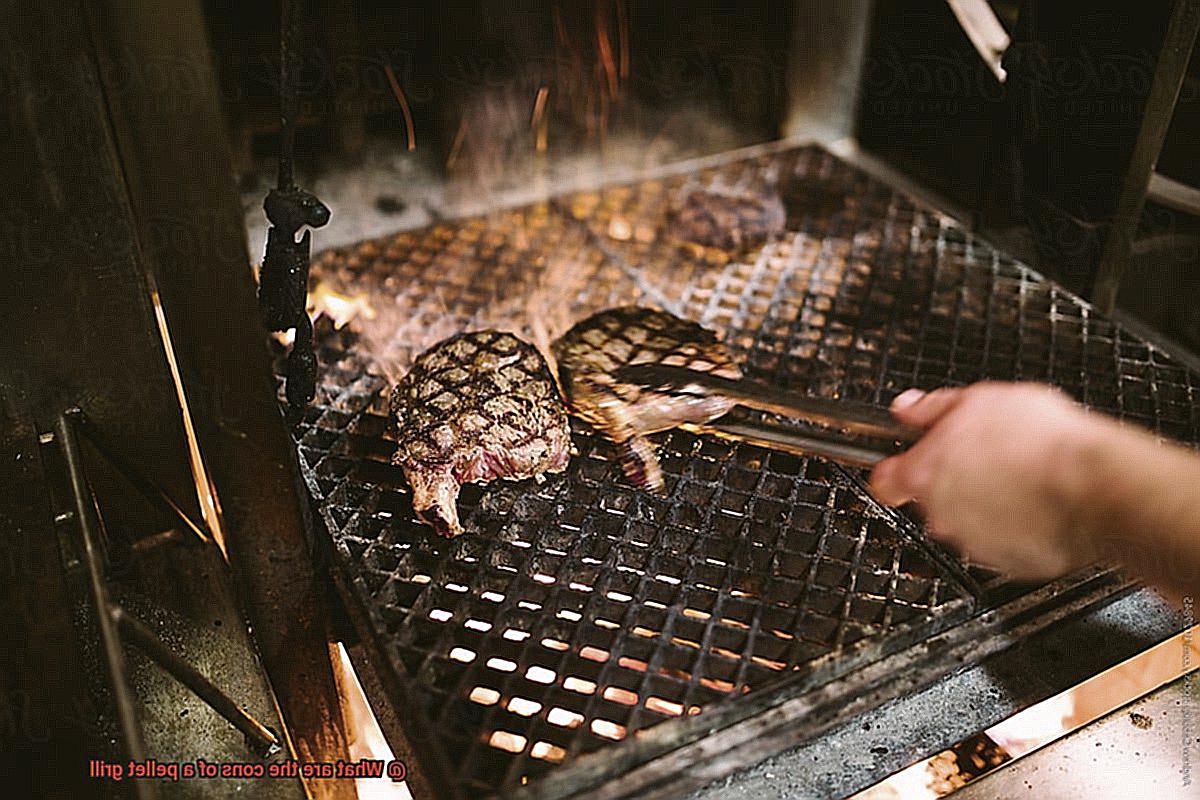
While there are many benefits to this versatile appliance, it’s important to understand its reliance on electricity. As an expert on the topic, I’ve researched the pros and cons of relying on electricity for your pellet grill.
On the downside, a power outage or electrical malfunction can render your pellet grill useless. This can be especially frustrating if you rely on your grill for outdoor cooking and entertaining, or if you’re planning to take it camping or to a remote location. Additionally, the cost of electricity may add up over time, depending on how often you use your grill and the cost of electricity in your area.
Despite these potential drawbacks, there are many benefits to relying on electricity for your pellet grill. One of the most significant advantages is consistent temperature maintenance. With a digital thermostat and automatic auger, your pellet grill can maintain a steady temperature throughout the cooking process. This means no more constantly adjusting vents or adding more charcoal.
Another advantage is the versatility of cooking options. Pellet grills allow you to smoke, grill, roast, and even bake all on one appliance. Plus, the pellets themselves come in a variety of flavors, giving you even more options for flavoring your food.
Finally, relying on electricity for your pellet grill can result in healthier grilling. Pellets made from hardwoods like oak or hickory burn cleaner than charcoal or gas, resulting in less smoke and fewer harmful chemicals in your food.
Complexity of Use
While pellet grills are known for their convenience and ease of use, there are some complexities that you should be aware of before making a purchase.
Firstly, it’s worth noting that pellet grills rely heavily on electricity. This means that in the event of a power outage or lack of access to an electrical outlet, you won’t be able to use your grill. This is an important consideration for those who plan on using their grill for outdoor adventures or camping trips.
Another potential issue with pellet grills is the complexity involved in getting the temperature just right. Some models require a lot of tinkering and adjustments to achieve the desired temperature, which can be frustrating for beginners. The built-in auger that feeds wood pellets into the firepot requires electricity to function, so you may want to look for a model with more advanced temperature controls if you’re not comfortable with manual adjustments.
In addition to temperature control, pellet grills require regular maintenance to keep them functioning optimally. The ash from burned wood pellets needs to be cleaned out periodically, and the grill’s components should be inspected for wear and tear. If you’re not comfortable with doing this type of maintenance yourself, you may need to hire a professional or rely on the manufacturer’s customer service team.
Lastly, some users find that pellet grills produce less smoke and flavor than traditional charcoal or wood-burning grills. This is because they use compressed wood pellets instead of natural wood or charcoal. While this may not be a dealbreaker for everyone, it’s important to consider if you’re looking for a strong smoky flavor in your food.
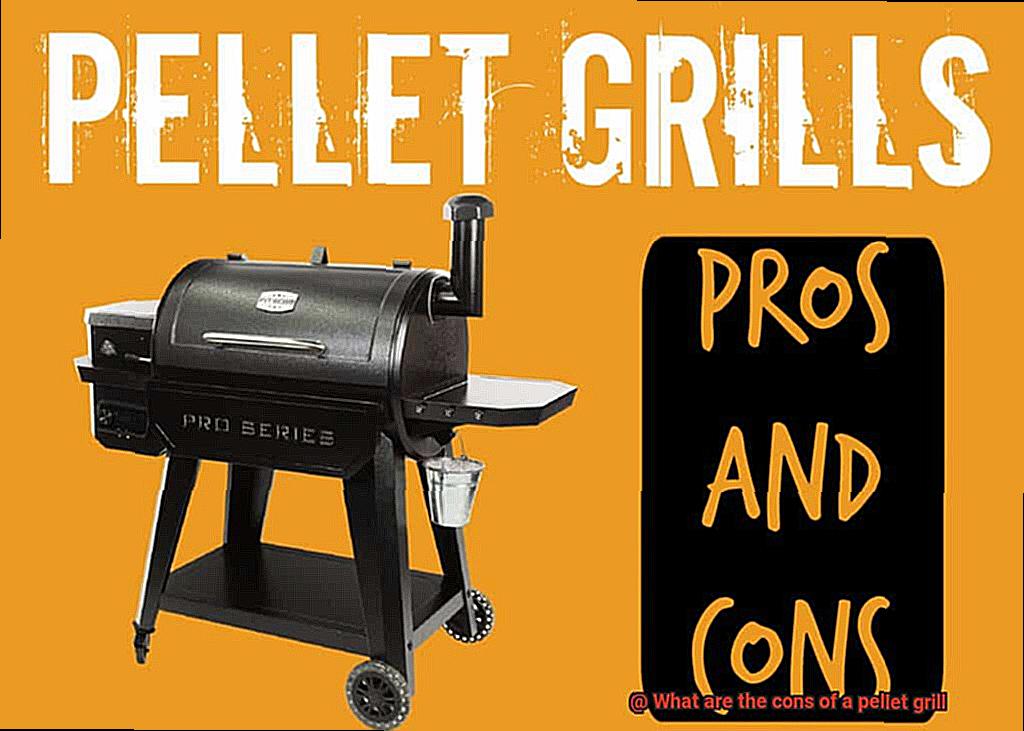
Ash Production
Grilling is an art form that requires time, skill, and the right equipment. Pellet grills have become incredibly popular among grill enthusiasts for their ease of use and consistent temperature control. However, one aspect of pellet grilling that is often overlooked is ash production.
When compressed wood pellets are burned as fuel in a pellet grill, they leave behind ash as a byproduct. This can pose several challenges for grillers, including inconvenience, temperature issues, and flavor concerns.
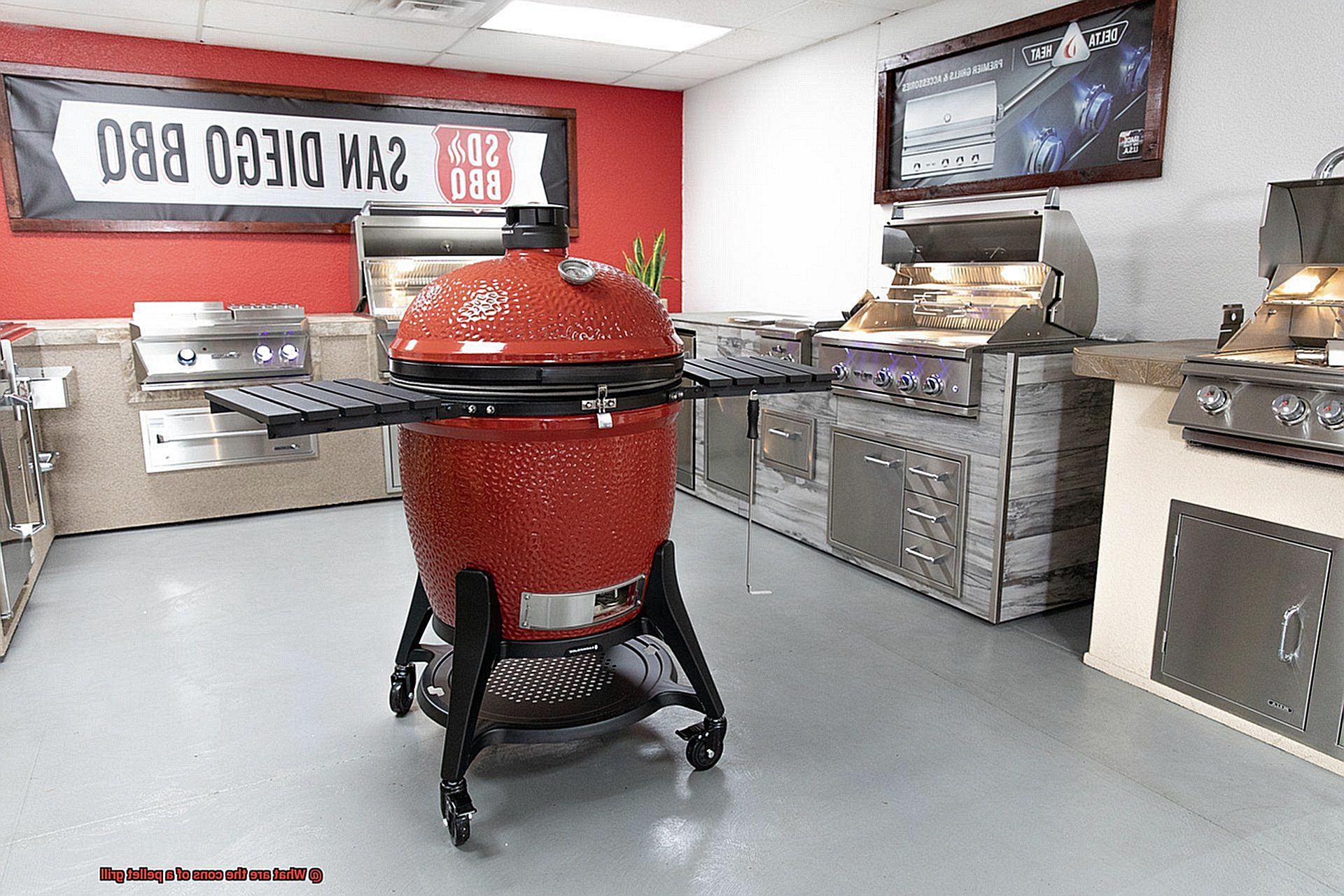
Cleaning out the ash from a pellet grill can be a time-consuming and messy process. Unlike gas or charcoal grills, pellet grills require regular maintenance to remove the accumulation of ash in the grill. This involves removing the grates, drip tray, and heat deflector to access the ash pan underneath. However, some pellet grills come with features such as an ash removal system or an easy-to-access ash pan for faster cleaning.
Ash accumulation in the grill can also block airflow and reduce the efficiency of the heating element. This can result in uneven cooking temperatures and longer cooking times, leading to overcooked or undercooked food. Additionally, if ash gets mixed with the pellets, it can create a bitter taste in the food due to the minerals present in the ash.
To minimize these challenges, it is recommended to clean out the grill after every use to prevent excessive buildup of ash. Using high-quality pellets with low ash content can also help reduce the amount of ash produced. By following these tips and maintaining proper cleaning practices, you can manage the issue of ash production effectively and ensure optimal performance and delicious grilled food.
Flavor Quality
When it comes to grilling, flavor quality is paramount. As a self-proclaimed grill enthusiast, you know that nothing beats the taste of perfectly cooked meat with that smoky flavor that only a grill can provide. However, with the rise of pellet grills, some argue that convenience and ease-of-use come at the cost of flavor intensity. So, what’s the deal with flavor quality on pellet grills?
One of the main reasons for this debate is that pellet grills use compressed wood pellets as fuel instead of traditional charcoal or propane. While these pellets can add a smoky flavor to your meat, some argue that it may not be as intense or authentic as that produced by traditional grilling methods. Additionally, the type and quality of pellets used can have a significant impact on the final flavor outcome.
Pellet grills also come with additional features such as temperature controllers and fans that can reduce the amount of smoke produced during cooking. This can result in a less intense smoky flavor that some grill enthusiasts may not prefer. However, it’s worth noting that these features can also provide more control over the cooking process and ultimately lead to more consistent results.
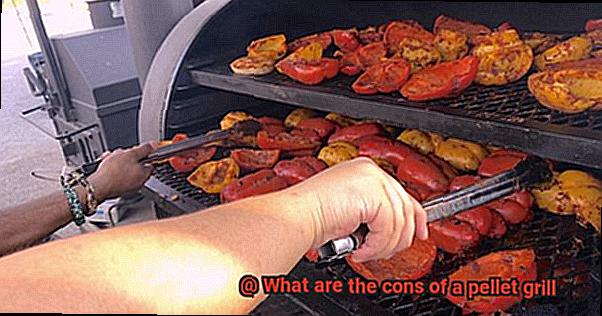
Despite concerns about flavor intensity, many people still enjoy the convenience of pellet grills. They offer an easy-to-use option for those who prioritize convenience over flavor intensity. Furthermore, high-end pellet grills often come with additional features like searing grates and smoke boxes that can enhance the overall flavor output.
Tips for Choosing the Right Pellet Grill
If you’re on the hunt for a new grill, you may have heard about the increasing popularity of pellet grills. However, selecting the perfect one for your needs can be a daunting task. To help you out, we have compiled a list of key factors to consider when choosing the right pellet grill.
Size Matters
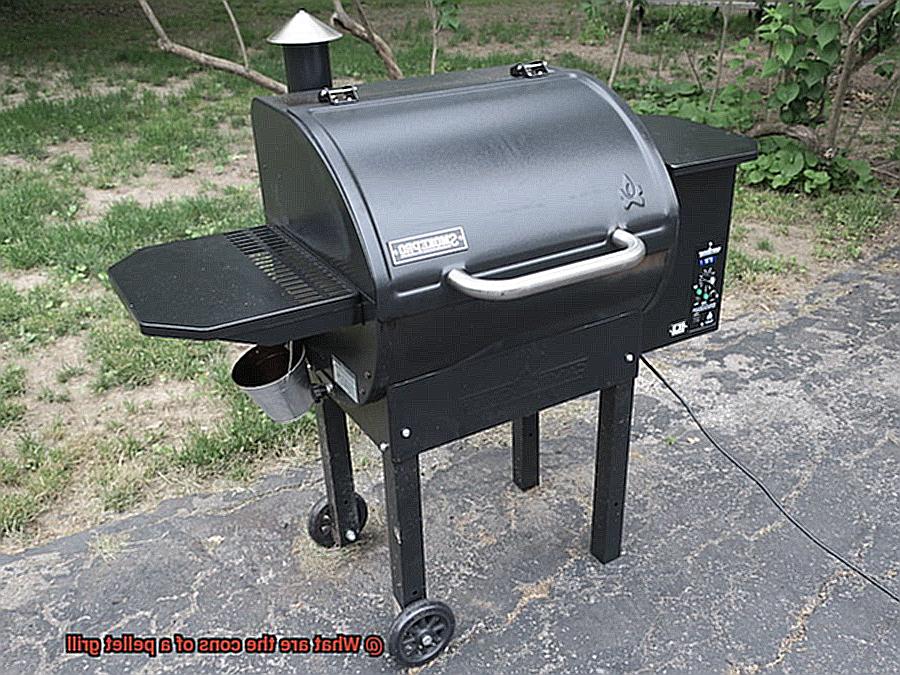
One of the most important factors to consider when choosing a pellet grill is its size. You’ll want to think about how many people you typically cook for and how much food you like to prepare at once. If you’re regularly cooking for a large group, you’ll need a bigger grill than if you’re only cooking for your family.
Temperature Range
Another crucial factor to consider is the temperature range of the grill. Different dishes require different temperatures to cook correctly, so it’s important to choose a grill that has a temperature range that accommodates your favorite recipes. Some models have limited temperature ranges, while others can reach up to 700 degrees.
Construction Materials
The quality of construction materials used in the grill is also an essential consideration. A pellet grill made from high-quality materials will last longer and perform better than one made from cheaper materials. Look for grills made from stainless steel or cast iron, which can withstand high temperatures and hold up well over time.
Additional Features
When choosing a pellet grill, it’s also important to consider additional features that can make using it easier and more efficient. Features like ash cleanout systems and grease management systems can make cleaning up after cooking a breeze. Digital controllers can also be helpful in maintaining consistent temperatures while cooking.
Price
Lastly, price is an important factor to consider when selecting a pellet grill. Pellet grills can range in price from a few hundred dollars to several thousand dollars, so it’s important to choose one that fits within your budget and offers the features you need most.
Benefits of a Pellet Grill
The pellet grills have become increasingly popular due to their convenience, ease of use, and remarkable benefits.
Firstly, one of the most significant advantages of a pellet grill is its ability to maintain a consistent temperature. Unlike traditional charcoal grills, pellet grills use an electric-powered auger to feed wood pellets into the firepot, resulting in precise temperature control perfect for low and slow cooking. Additionally, maintaining this temperature is effortless, thanks to the digital controllers that allow you to set the desired temperature and time effortlessly.
Moreover, pellet grills are incredibly easy to use, even for beginners. With Wi-Fi capabilities on some models, you can control the grill from your smartphone or tablet, taking your outdoor cooking experience to the next level. No more constant monitoring required.
The versatility of pellet grills is unmatched. Whether you’re smoking, baking, or grilling, these grills can handle it all, making them an excellent choice for outdoor cooking enthusiasts who want to cook different types of food at different temperatures. You can experiment with new recipes and techniques, explore your creativity in the kitchen, and impress your guests with restaurant-quality meals.
Finally, pellet grills are cost-effective in the long run. Although they may be more expensive than traditional charcoal or gas grills initially, they use fewer pellets and produce less waste when cooking food, making them more efficient and cost-effective over time.
eqi0VAvfi9E” >
Also Read: Are Pellet Grills Good for Burgers?
Conclusion
In the world of BBQ, pellet grills have quickly become a fan favorite. With their ability to maintain consistent temperatures and offer versatility in cooking methods, it’s no wonder why they’ve gained such popularity. However, before you go out and purchase one of these high-tech grills, there are a few cons to consider.
First and foremost, cost is a major factor to keep in mind. The advanced technology used in pellet grills adds to the manufacturing costs, making them pricier than traditional charcoal or gas grills. Additionally, ongoing expenses associated with using a pellet grill should also be taken into account.
Another potential downside is ash production. Cleaning out the ash from a pellet grill can be messy and time-consuming. If not properly maintained, ash accumulation can block airflow and reduce the efficiency of the heating element.
Despite these drawbacks, owning a pellet grill has long-term benefits that make it an excellent investment for many grill enthusiasts. Pellet grills produce less smoke and fewer carcinogens than traditional grilling methods, making them a healthier option. Plus, their versatility allows you to smoke, bake, grill, and roast all in one appliance.
When selecting your perfect pellet grill, be sure to consider factors such as size, temperature range, construction materials, additional features and price.

